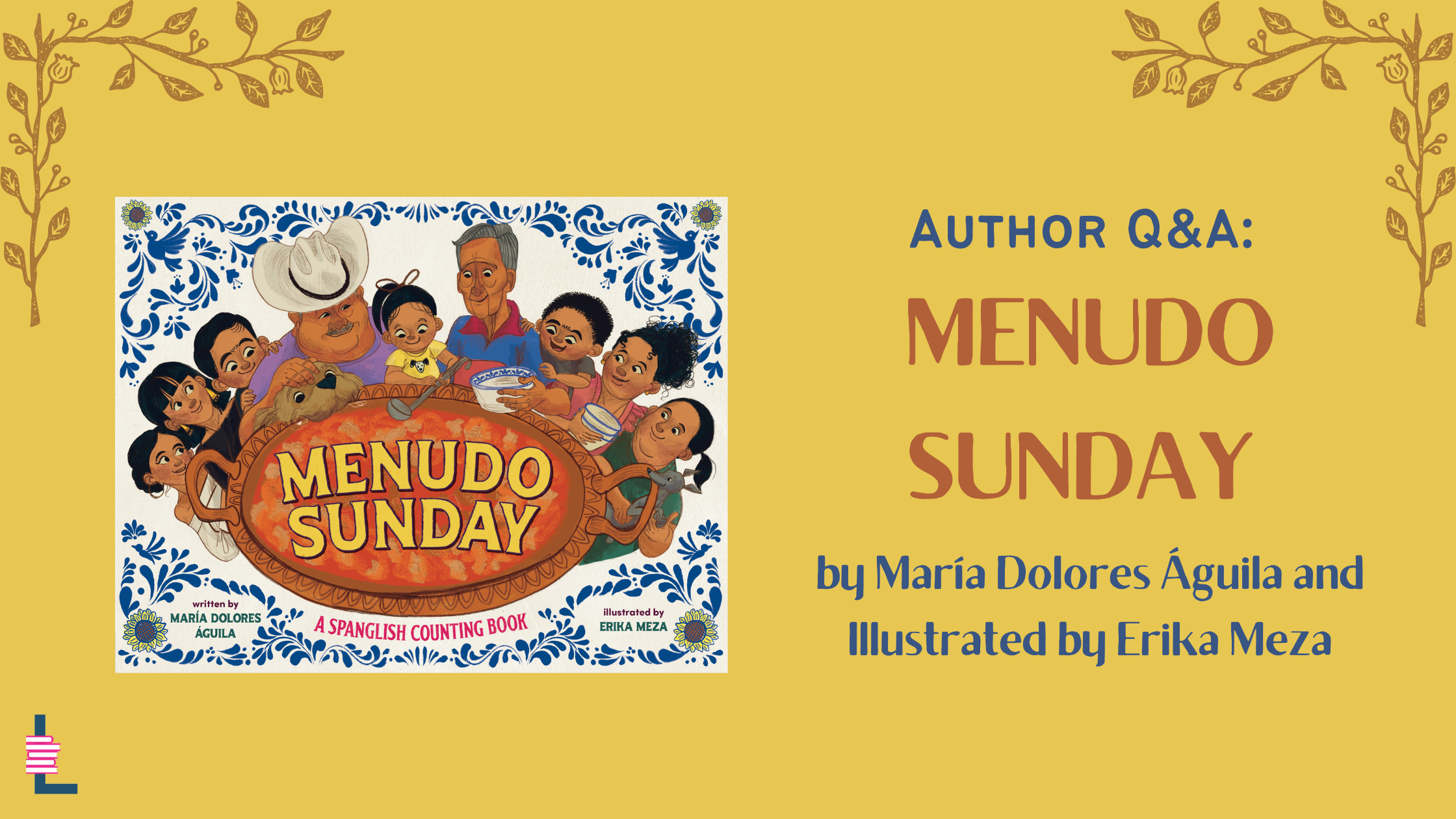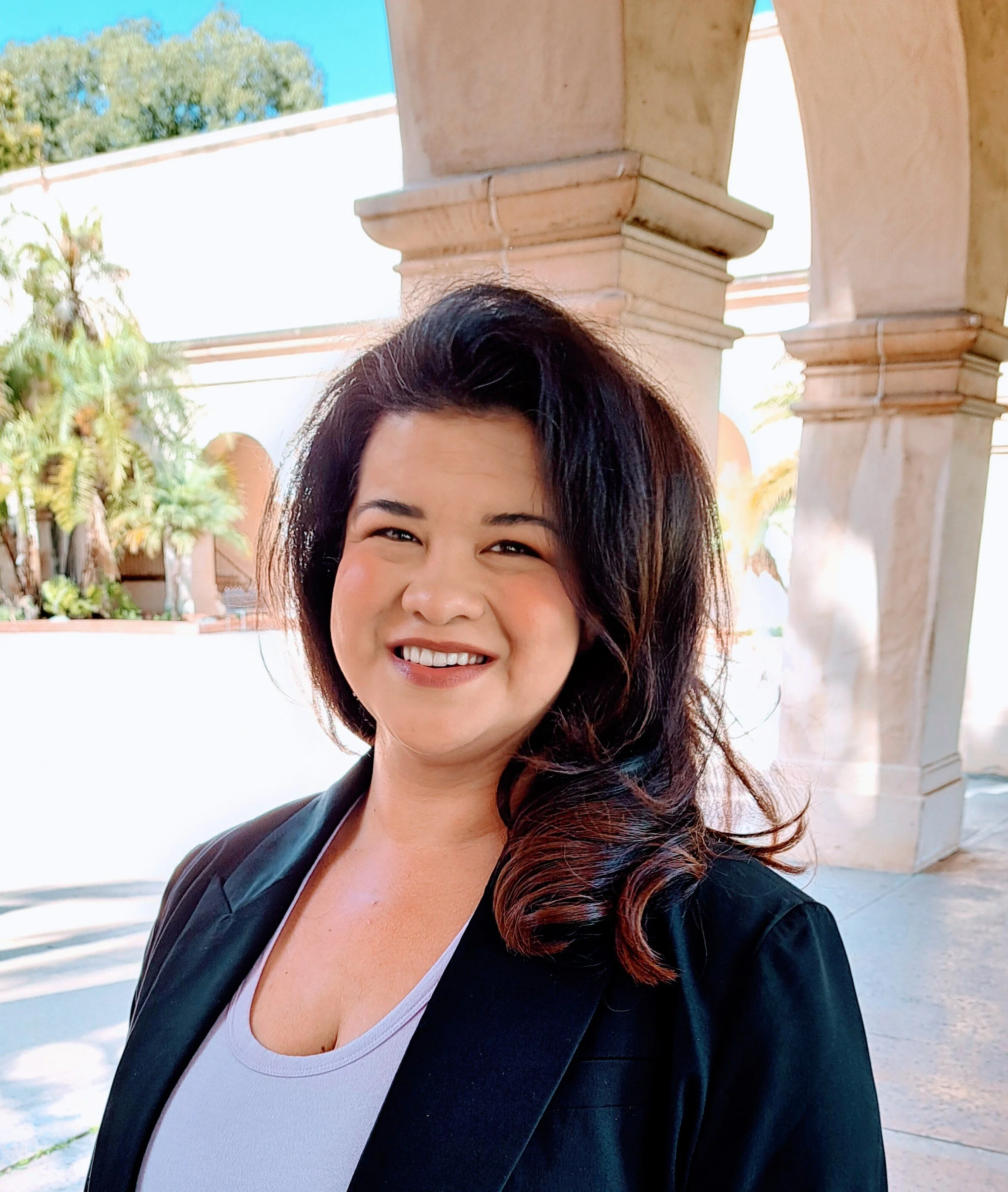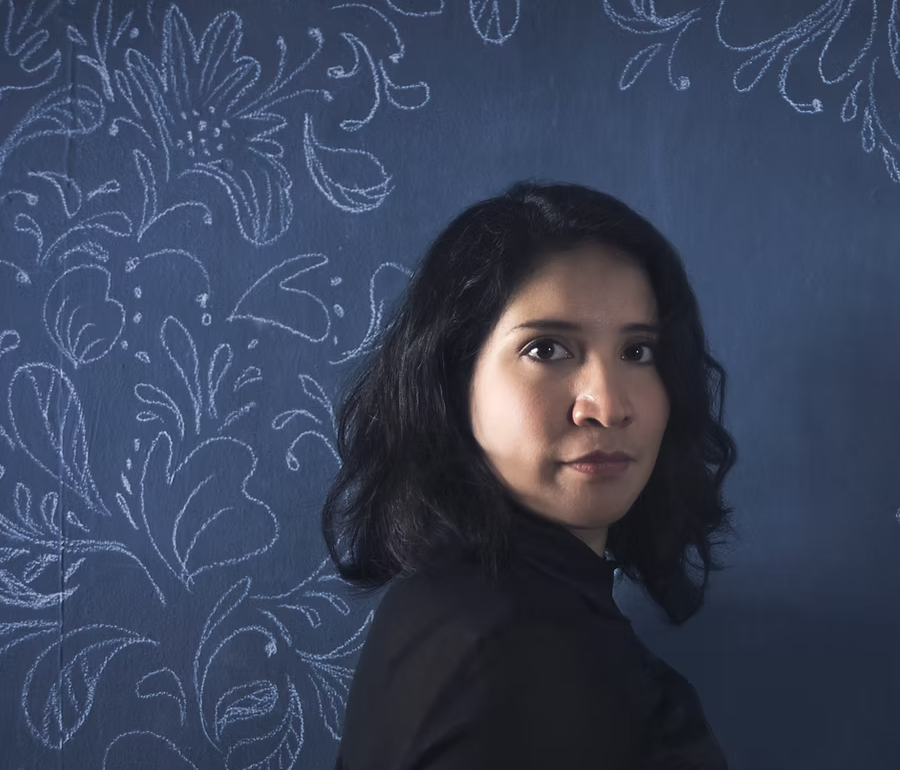Menudo Sunday begins with joyful anticipation. An older man, smiling, sits outside a warm yellow house. A woman and a boy pull out plastic chairs from a stack to arrange them side by side. And a grinning young girl sprints to one of her abuelos, who waits for her by the iron front gate.
“One cozy casita,” author María Dolores Águila writes. “Two grinning abuelitos.”
Out now from Dial Books for Young Readers, Menudo Sunday is a counting picture book that follows a family over one lively Sunday. The girl and her mamá, abuelos, tías and primos always gather on this day to enjoy a pot of menudo, a traditional Mexican soup made with beef tripe and hominy. The book counts from 1-15 in Spanish and English, until Abuelito Esteban’s special bowl of menudo breaks. Can the family work together and still make this a special Sunday?
Menudo Sunday is Águila’s second picture book and largely inspired by her own Sunday gatherings at the home of her paternal grandmother in San Diego. Illustrations by Erika Meza bring tremendous color and humor into the family’s already chaotic Sunday, adding to the book’s excitement. Menudo Sunday is a vibrant and fun read, and includes a Spanish glossary, author’s note, and even tips for hosting your very own Menudo Sunday.
Águila spoke with Latinx in Publishing recently about the inspiration behind her picture book.
This interview has been edited for clarity and brevity.
Amaris Castillo (AC): Congratulations on Menudo Sunday. In your author’s note, you write about how some of your most cherished memories are from the menudo Sundays you’d spend at your paternal grandparents’ home in San Diego, California. I’d love to start by asking, what is a Menudo Sunday?
María Dolores Águila (MDÁ): My paternal grandma lived in San Diego, and had this huge yard. It felt like a jungle when we were kids. She had eight kids, so I have a lot of aunts and uncles, and they all have kids. We would all descend on her house on Sundays and she would make this humongous pot of menudo.
She had this tiny two-bedroom house. And because there were so many of us, we would take turns eating in shifts. First all the adults would go, then all the older cousins, and then the younger cousins or whoever showed up late or whatever. For me, it was this unstructured spending time together… just this beautiful moment of being with family.
AC: Your book is a Spanglish counting book. When you began to write it, did you envision it in Spanglish?
MDÁ: Yes, from the beginning. I always tell people, I live my life in Spanglish. That’s how everything filters through me. I know people say it’s not proper, but some things are better said in Spanish. Some things are better said in English. In National City, where I live in San Diego, I spend half of my day speaking Spanish. So for me, it’s very natural to write in Spanglish because that’s how I share my lived experience with the world.
AC: Menudo Sunday is chock full of details, from two grinning abuelitos to seis – six little bowls filled with salsa, cilantro, lime, oregano, onion and jalapeño. Walk us through how you chose which details are a must for Menudo Sunday?
MDÁ: It took quite a few drafts to figure out how to decide what numbers to put for what. For the very first draft I was really literal. I thought it had to be something that you could physically count. Rosie (Ahmed) was my editor at the time and pushed me to rethink what counting can be. And so now we have things like, “ten dedos stealing tasty treats” and “eleven risitas when the grownups aren’t watching.” And Erika did such an amazing job even illustrating how to count those. When I was trying to create a story from the numbers, I thought, OK, how can I move through these numbers and still tell a story, and still have something to count? It was an enjoyable experience. It was like putting together a puzzle.
“And Menudo Sunday is a book of resilience. I think resilience comes from allowing yourself to experience joy and happiness. Even though things are tough, things are hard, life is stressful, still allowing yourself to experience beautiful, ordinary moments of life, that’s what it’s made out of. ”
AC: About halfway through the book, the special bowl of menudo crashes and menudo spills everywhere. At that moment it felt like the family’s whole Menudo Sunday was in jeopardy. How did you come up with that big obstacle?
MDÁ: When I wrote the very, very first draft of Menudo Sunday, I had it from 1 to 20. When the bowl broke, I had the character in “16 minutos of time-out.” That’s how I originally had it. And Rosie pushed me. She was like, I don’t know about putting her in time-out. Then I thought about it. I don’t even do time-out for my own kids. We figure out how to fix things together. I kept thinking about it and realized I have a really big chance right now.
You know what chancla culture is, right? It’s always about the Latina mom coming after you with a chancla if you do something wrong. I get it, it’s funny, but that’s still a punitive thing. For our generation, where we’re raising kids now and trying to break these generational curses, I thought the best thing we could do is figure out how to solve this together, and not blame anyone. Yeah, they shouldn’t have been doing all that. But you know what? Kids are kids. And it doesn’t have to be the end of everything. We can come together and we can fix it, and we will be just as good as we were before. I’m trying to push back against chancla culture, and I’m trying to show some social, emotional learning – that fixing something is better than being punished.
AC: What do you think Erika Meza’s illustrations added to the story?
MDA: I don't even know if I could list everything that her illustrations added to the story. I really love the body diversity of the characters; there’s skinny ones, there’s mas gorditas. I love that, because I’m a gordita myself and I often don’t see myself in a book. The focus is not on that. They’re just there in the story.
I also love all the little Easter eggs that she put throughout the story. And then after the crash is my favorite illustration. I know it’s really silly, but when it reads “fifteen fragmentos scattered across the ground,” one of the aunts is looking at the dog, really pissed off. It makes me laugh so much every time I see it. I love books like this, where there’s so much to look at. I think it adds re-readability to the story, because every time I read it I notice something new.
AC: What are you hoping readers take away from Menudo Sunday?
MDÁ: Barrio Rising was very much a book of resistance. And Menudo Sunday is a book of resilience. I think resilience comes from allowing yourself to experience joy and happiness. Even though things are tough, things are hard, life is stressful, still allowing yourself to experience beautiful, ordinary moments of life, that’s what it’s made out of. I just want readers to see themselves in this book, to connect with Chicano culture, to see themselves and to look for the joy and the family food traditions in their own lives.
María Dolores Águila is a Chicana poet and writer from San Diego, California. Deeply inspired by Chicane history and art, she seeks to write empowering and inclusive stories about everything she learns. She is also the author of the historical fiction picture book Barrio Rising: The Protest That Built Chicano Park.
Erika Meza was born in Mexico, fell in love with animation on the border of California, and developed a taste for eclairs in Paris before moving to the UK to teach at Nottingham Trent University. She is the illustrator of numerous children’s books including My Two Border Towns by David Bowles and Salsa Lullaby by Jen Arena.
Amaris Castillo is an award-winning journalist, writer, and the creator of Bodega Stories, a series featuring real stories from the corner store. Her writing has appeared in La Galería Magazine, Aster(ix) Journal, Spanglish Voces, PALABRITAS, Dominican Moms Be Like… (part of the Dominican Writers Association’s #DWACuenticos chapbook series), and most recently Quislaona: A Dominican Fantasy Anthology and Sana, Sana: Latinx Pain and Radical Visions for Healing and Justice. Her short story, “El Don,” was a prize finalist for the 2022 Elizabeth Nunez Caribbean-American Writers’ Prize by the Brooklyn Caribbean Literary Festival. She is a proud member of Latinx in Publishing’s Writers Mentorship Class of 2023 and lives in Florida with her family.










